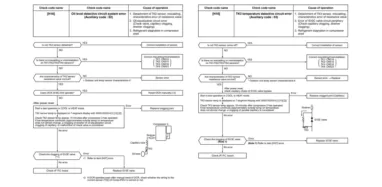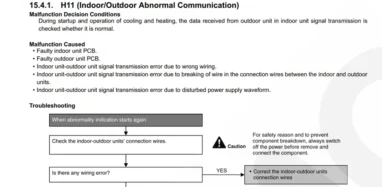A close study of how a heat pump works will reveal to you how this indispensable household appliance can be an excellent agent for airborne diseases and the like. This is why it is not uncommon to see people ask questions like, do heat pump gets moldy? Does mold survive the heat? After all, it uses heat from untreated outdoor air to heat the room.
In some way, that may seem pretty logical, but since heat pumps are designed with air filters that work like your kitchen sieve to ensure only quality air comes into your room, it should be impenetrable by molds and other airborne allergens, right? Well, all these are the few intricacies that make up the body of this article. Don’t miss out on any of the details!
Do the heat pumps get moldy?
Yes, heat pumps get moldy. When you constantly use your heat pump without cleaning them, it will create a perfect environment for mold and other allergies to grow in your unit. With time, if the required attention is not given, this mold will get airborne and find its way into your room, and when this happens, the air circulating in your room may become unhealthy for you.
Do heat pumps cause mold?
Yes, heat pumps cause mold. Actually, it will be rather unfair to say heat pumps cause mold because most of the time, when this happens, it is due to your negligence: you do not have a cleaning maintenance plan for your device.
A heat pump must transfer heat between indoor and outdoor spaces, but in this process, especially during dehumidification, condensation is created, which will build up on your coil: this will create an environment for mold to thrive, and if the appropriate response is not given, these molds will end up in your room and pollute the air.
When this is ongoing, homeowners are usually notified of water leakages from their heat pump, but most see this telltale sign as a trivial issue.
How to heat your house with a heat pump
A heat pump is one of the best appliances you can rely on when it comes to your indoor comfort. However, their efficiency depends on how they are used. This device can create a cool environment during summer and a hot atmosphere during winter.
To get the best out of the two seasons, you have to know the proper setting to achieve results. The procedures are carefully explained below.
Heating your house during winter
- Set your heat pump to heat-mode at 20°c or 68°f. It will keep your system working optimally. You can also make changes later on. For example, when you are going out, you can lower the temperature or turn it down. Only that for the latter option, your device may consume more energy trying to get back on. During the night, you can also utilize any of the two options.
- Place your heat pump in a position free of obstacles. Placing your heat pump where it can be obstructed by objects can reduce its efficiency because these items can block the flow of air. Instead, the airflow should be directed to the floor so that air can spread freely across the room.
What causes a heat pump not to heat?
Low refrigerant level
Heat pumps use refrigerants to exchange heat between coils (indoor and outdoor coils). When the refrigerant is low, the ability of the heat pump to transfer heat into indoor space will reduce.
One of the signs of reduced efficiency is the inability of your device to heat your room. Although your heat pump might keep working on low refrigerant with time, it may lead to a total breakdown of your coil or other crucial components of your unit.
You need to recalibrate your thermostat
Sometimes when the set temperature does not produce the expected heat, the cause may not have resurrected from your heating device itself; the problem might have erupted from your thermostat. There are several reasons your thermostat may be performing below the set standard, but most have been linked to calibration problems and dirt and dust build-up.
The first problem can be fixed by recalibrating the thermostat by turning up the thermostat a few degrees up. While as for the latter case, you can remove the faceplate and clean off any dirt or dust you notice on the surface.
Faulty reversing valves
Believe it or not, one of the reasons behind the popularity of heat pumps among homeowners today is their ability to switch between cold and heat. The component responsible for the change between temperature modes is the reversing verve. Without the reversing valve working, your heat pump will find it difficult to switch between modes. If your reversing verve is stuck in cooling mode, it will not heat your room. Unfortunately, there’s no quick fix to this unless you contact a technician.
Blocked air duct
Every heat pump has an air duct through which warm or cool air is transferred into the room. When this crucial component is faulty or becomes clogged with dirt and dust, it will become hard for the required warm needed to heat the room to go through the air duct. A thorough cleaning or repair of the component by a technician will solve this problem.
What happens if you don’t clean your heat pump?
The simple answer to this is that your heat pump will stop being efficient because dirt will interfere with its ability to operate optimally. In some cases, the implications may go beyond that, as dirt can lead to a total breakdown of some essential parts of your unit.
Does mold survive the heat?
No, molds don’t survive the heat. Although mold can tolerate heat to some extent, when the heat becomes extreme, for instance, around 140°f or 60°c, it will be hard for them to survive, same for every other biological contaminant in the house.
Why does my heat pump stink?
Clogged filter
When your heat pump air filter becomes clogged due to a lack of proper cleaning practice, the motor of your heat pump will start to work harder than usual. This may cause your heat pump to emit a burning smell which you will perceive in your room as a fume.
Mold growth
If you perceive a musty smell coming from your heat pump, it is likely because mold is growing on either the evaporator coil or in your heat pump ductwork. Most time, this is also caused by a lack of good cleaning maintenance culture.


